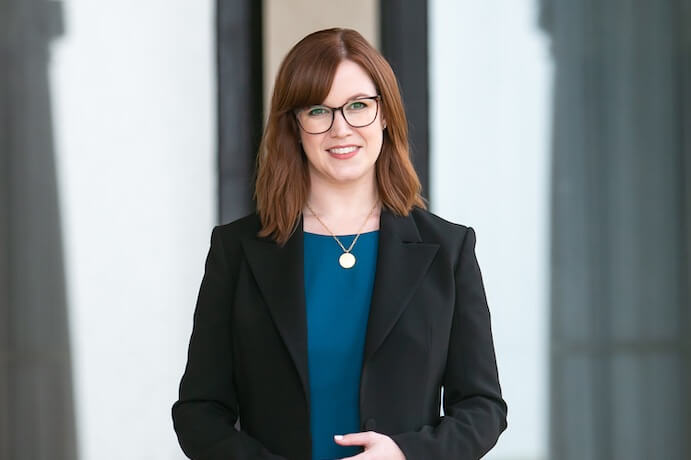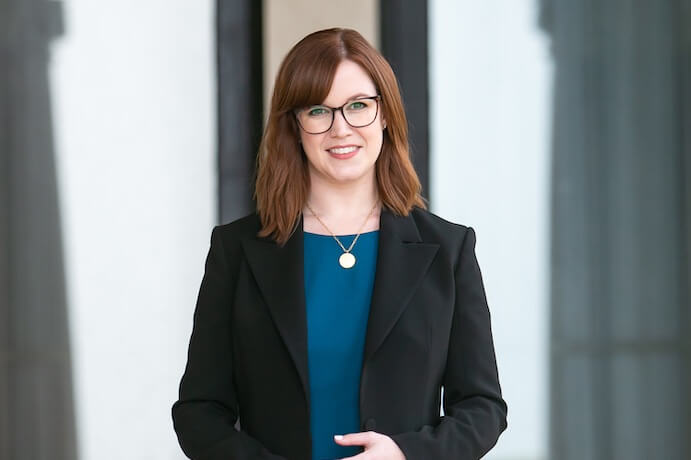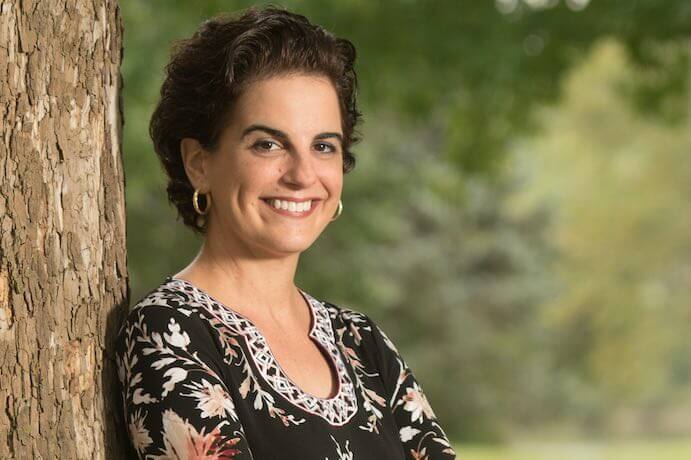
Since its founding in 1969, the Newport Music Festival has presented over 2,000 concerts at Rhode Island’s historic mansions, built by families like the Vanderbilts as “summer cottages” during the Gilded Age of the mid-19th century. Led by Executive Director Gillian Friedman Fox (formerly of the Dallas Symphony Orchestra), the 2021 season features a strong commitment to new music with works by Jessie Montgomery, Tomeka Reid, Clarice Assad, Sarah Kirkland Snider, Gabriela Lena Frank, Du Yun, Matana Roberts, and Reena Esmail performed by artist such as A Far Cry, Harlem Quartet, Third Coast Percussion, Lara Downes, Brooklyn Rider, and Anthony McGill. As part of a new commissioning initiative, this year’s festival will also include the world premiere of a new work by Stacy Garrop for the Boston Trio. In advance of the 2021 season, we asked five questions to Gillian about programming living music creators for traditional classical music audiences.
Congratulations on your new role as Executive Director of the Newport Music Festival! Can you give us a brief overview of some of this season’s highlights?
It has been such a rewarding whirlwind these past few months, and I am so excited that we are able to present such a robust Festival this summer, given the uncertainty of this past year. The Newport Music Festival is supported by an incredible team, between the Board of Directors, staff, and volunteers, and it was a true community effort to put this summer together. All 17 concerts are outdoors, on the grounds of the historic mansions and venues around the island. We start off with two free concerts open to the whole community: one at King Park for the 4th of July, and one at Rough Point – the family home of the iconic Doris Duke.
The programming then turns to a fantastic line-up at The Breakers out on the side lawn, with artists such as A Far Cry, Harlem Quartet, Chanticleer, and Brooklyn Rider. We are also excited to host our traditional Sunrise Concerts at the Norman Bird Sanctuary, the Boston Trio at Castle Hill, and two gorgeous morning concerts at The Chanler at Cliff Walk. The festival concludes on Tuesday, July 20th with Anthony McGill at Bellevue House, a private home with stunning gardens.
Trevor Neal, Director of Artistic Planning and Engagement, and I had a lot of fun programming this season together and are already lining up exciting programs for next summer.

Gillian Friedman Fox–Photo by Meghan Sepe
The 2021 season marks a significant departure point for Newport Music Festival in that almost every concert includes works by living composers. Based on early ticket sales and feedback, how are audiences responding to this new direction?
The goal with this year’s programming is to show the connection between familiar, standard repertoire and music that is being composed today to demonstrate that classical music is a living genre which continues to evolve. We were so thrilled to see the overwhelmingly positive response from our patrons – 14 concerts sold out within the first few hours, which has never happened for NMF before.
Recently, with the easing of COVID-19 restrictions, we were able to increase capacity at several of our venues, with many of those seats going to the hundreds of patrons on our waitlist. Our long-time patrons are excited to be introduced to artists and repertoire unfamiliar to them, and at the same time, we are welcoming many new audiences to the Festival. 12% of our audience this summer will be attending the Newport Music Festival for the first time, which is very exciting.
Starting this year, Newport Music Festival is committing to annually commissioning a new work by “a Black, Indigenous, person of color, or woman composer.” How will you ensure that people at the intersection of these identities are represented?
Our new annual commissioning initiative is a meaningful way to build on the Festival’s legacy of musical curiosity while promoting the future of the genre and expanding our audiences. As champions of classical music, I feel it is our responsibility to support composers and add to the repertoire. I know our audiences will be excited to expand their definitions of what classical music can be. Deepening that commitment, we are focused on championing the artistic perspectives of composers from a variety of backgrounds, including those that many presenters, including our Festival, have presented less frequently in the past. We intentionally have a very broad definition of who those voices can be, and we are excited to be introduced to new interpretations and artistic ideas throughout the process. We are seeking to create a more inclusive organization with this initiative.

Stacy Garrop–Photo by Darrell Hoemann
Can you tell us a little bit about this summer’s commission from Stacy Garrop?
I had the pleasure of working with Stacy during my time with the Dallas Symphony Orchestra, where we commissioned a piece called Slipstream for horn, clarinet, and piano. This work was so dynamic and relevant, and I knew she would bring sensitivity and depth to a new work in honor of the Newport Music Festival. When I presented the idea to long-time NMF resident artist Irina Muresanu, she was already very familiar with Stacy’s work and excited by the opportunity, and everything came together from there.
We had one Zoom call with Stacy, Trevor, Irina and the rest of the Boston Trio (Jonah Ellsworth and Heng-Jin Park), and the chemistry was palpable. Everyone left that call feeling inspired and enthusiastic about the collaboration. Afterward, Stacy came up with the inspiration for the nine lighthouses that protect the city of Newport, and particularly the one off the shore from Castle Hill. Stacy’s research and artistic direction has inspired the future of the commissioning initiative, which will now honor a different historic Newport landmark each year.
The Newport mansions are stunning and iconic venues, but they are also monuments to exorbitant wealth and privilege. How do you reconcile attempting to reframe the image of classical music as elitist and inaccessible against this backdrop?
These mansions were built at the turn of the century to be the summer homes for families such as the Vanderbilts, Astors, and Wideners, and are symbols of high society and opulence. However, that does not wholly define the concert experience when audiences come to these historic houses to engage with the music we are presenting. As a festival, we bring a freshness and intimacy to these venues, bringing them back to life in a unique and current way. With the expansion of our programming and its relevance to today, we are working to create an environment that is welcoming of all audiences, inviting them to come together and explore what classical music can be.
I CARE IF YOU LISTEN is an editorially-independent program of the American Composers Forum, funded with generous donor and institutional support. Opinions expressed are solely those of the author and may not represent the views of ICIYL or ACF.
A gift to ACF helps support the work of ICIYL. For more on ACF, visit the “At ACF” section or composersforum.org.


